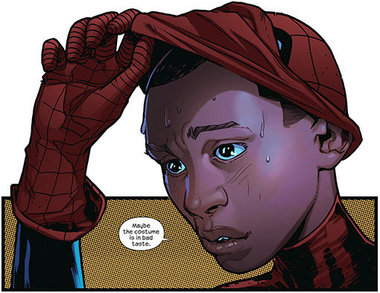
August 22, 2011

Alas, most of those artists and writers are long dead and their creations are now corporate property. Hence the unedifying spectacle of Superman “renouncing his American citizenship” this year because “truth, justice, and the American way” are “not enough anymore.”
“When Superman, Batman, the Green Lantern, The Phantom, The Shadow, The Spirit, and others were created, America was 90 percent white,” says Kersey.
“In a country that is increasingly nonwhite,” he continues, “this ‘whiteness’ is now a nuisance.” He points out that in 2000, a DC Comics Justice League storyline made the Green Lantern African-American “because they didn’t want a bunch of white guys saving the world again.” Then in 2002, Marvel announced they were doing a series depicting Captain America as black—something to do with the Tuskegee experiment, apparently.
So it comes as no surprise that Marvel Comics has killed off the white Peter Parker/Spider-Man and replaced him with a half-black/half-Hispanic character. A film unmasking this makeover is scheduled for release in 2012—and creator Stan Lee isn’t thrilled about it.
But if Spider-Man becomes darker, what happens to the villains?
Kersey notes, “If you watch the 2002 Spider-Man film, all of the people that he apprehends are white. Never mind that between 2003 and 2009, 89 percent of the murderers in New York City were Hispanic or black.”
He isn’t sure the “Disingenuous White Liberals” (DWLs, as he calls them) who run the comic-book industry have thought that matter through. Kersey sarcastically applauds them for (accidentally) reflecting reality:
“Having a half-black/half-Hispanic Spider-Man is hilarious, because his origin story is quite simple: Horrible rates of black and Hispanic crime in New York City can only be dealt with by a half-black/half-Hispanic hero. A white hero would be called racist for dealing with these thugs, so having [a biracial hero] don the red and blue tights makes absolutely perfect sense.”
Unless, as is likely the case, the villains in Spider-Man’s universe remain lily-white. Then Hollywood execs will be obliged to explain why they’re glorifying a black-Hispanic superhero who only beats up Caucasians.
I have a feeling that the biracial Spider-Man movie won’t be coming out next year after all.
Meanwhile, Kersey plans to keep writing and blogging.
“If there is one thing I’ve learned from doing SBPDL,” he tells me, “there is a huge base of people out there (conservative, libertarian, Democrat, Republican, atheist, Jew, Christian, etc.) that is tired of Black-Run America. If one conservative would say ‘no more’ to one of these members of organized blackness when they try and shake them down, you’d see a star made overnight.”
That star won’t be Kersey, however. Like his fictional namesake and the superheroes he writes about, Kersey plans to remain anonymous:
“I’m young—27—and have family members to protect.”